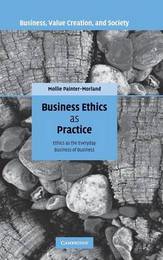
|
Business Ethics as Practice: Ethics as the Everyday Business of Business
Hardback
Main Details
| Title |
Business Ethics as Practice: Ethics as the Everyday Business of Business
|
| Authors and Contributors |
By (author) Mollie Painter-Morland
|
| Series | Business, Value Creation, and Society |
|---|
| Physical Properties |
| Format:Hardback | | Pages:322 | | Dimensions(mm): Height 234,Width 152 |
|
| Category/Genre | Business ethics |
|---|
| ISBN/Barcode |
9780521877459
|
| Classifications | Dewey:174.4 |
|---|
| Audience | | Professional & Vocational | |
|---|
|
Publishing Details |
| Publisher |
Cambridge University Press
|
| Imprint |
Cambridge University Press
|
| Publication Date |
4 December 2008 |
| Publication Country |
United Kingdom
|
Description
In recent years, a succession of corporate scandals has rocked the international business community. As a result, many companies have invested considerable time, money and effort on the development of ethics management programs. However, in many cases, such programs are nothing more than insurance policies against corporate liability, designed merely to limit the fallout of scandals should they occur. In Business Ethics as Practice, Mollie Painter-Morland urges us to take business ethics seriously by reconsidering the role of ethics management within organizations. She redefines the typical seven-step ethics management program from within - challenging the reader to reconsider what is possible within each aspect of this process. In doing so, she draws on the insights of Aristotle, Nietzsche, Heidegger, Foucault and numerous contemporary organizational theorists and sociologists to create the space for the emergence of a morally responsive corporate ethos.
Author Biography
Mollie Painter-Morland is Associate Professor in the Department of Philosophy at DePaul University, Chicago. She is also Associate Professor in the Department of Philosophy at the University of Pretoria, South Africa, where she was, for many years, Director of the Centre for Business and Professional Ethics. In this capacity she acted as ethics management consultant to various business corporations and the South African government. In 2006, she was awarded an International Ethics Award by the Society of Corporate Compliance and Ethics (SCCE) for her contributions to the ethics profession internationally.
ReviewsReview of the hardback: '... a stimulating and readable account of how and why we must return to understandings of 'ethics as practice' within the corporation as opposed to the current reliance on 'ethics management practices'.' Jane Collier, Judge Business School, University of Cambridge Review of the hardback: 'Mollie Painter-Morland has managed to do what many others have been unable or unwilling to do - provide an insightful integration and essential interconnection between ethical theory and practice. In so doing her work gives us a more enlightened view of business and the appropriate ethical foundations upon which its legitimacy rests and success depends.' Michael Hoffman, Executive Director, Center for Business Ethics, and Hieken Professor of Business and Professional Ethics, Bentley College Review of the hardback: 'This book challenges the usual approaches to business ethics ... forces us to rethink our well-worn paradigms and business practices through dynamic viable alternatives. This is a very important new contribution to the literature.' Patricia Werhane, Ruffin Professor of Business Ethics, University of Virginia 'This book by Mollie Painter-Morland points clearly in a very exhaustive manner at what have been some of the fundamental problems that have plagued the field of business ethics since its beginnings ... It is an excellent source for academics interested [in] the actual deployment of ethical theories into business practice and their links with other relevant fields of business studies. It is well written and suitable for a course both at the undergraduate and postgraduate levels which could be easily integrated with other management and business areas of study. At the same time, this book is an excellent source for practitioners aiming at understanding different perspectives in business ethics and theoretical frameworks in a cohesive manner and going beyond the classic paradigms of ethics as abstract sets of rules or as mere compliance checklist systems.' Stefano Cavagnetto, History of Economic Thought and Policy
|